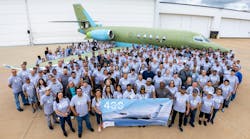Nearly 23 years after 9/11, the feds are finally expected to make all commercial planes have secondary cockpit barriers to prevent planes from being hijacked.
Congress on Wednesday passed a bill that would require secondary cockpit barriers on all commercial aircraft. The installation of secondary cockpit barriers on all commercial passenger flights is the only 9/11 Commission recommendation that has not been implemented.
The House of Representatives’ 387-26 vote on Wednesday comes about a year after the FAA announced that it will require a secondary barrier on the flight deck of new commercial airplanes.
The bill now heads to President Joe Biden’s desk to be signed into law.
Advocates have been pushing for secondary cockpit barriers for decades, saying they’re key to preventing the hijacking of airplanes and keeping terrorists out of the cockpit.
On 9/11, terrorists stormed the cockpit knowing that the doors would be opened early in the flight.
“I can only imagine what Victor was thinking as his cockpit was breached,” said Ellen Saracini, whose late husband Captain Victor Saracini was the pilot of United Flight 175 on 9/11. “But today, even through these clouds, I know he’s smiling down, that no one will be able to ever breach the cockpit.
“No one will ever be able to take a plane out of the sky,” she said, later adding, “Everyone’s going to be safe. This is going to now be setting a standard for everyone to follow.”
Flight 175 and American Airlines Flight 11 both left Logan Airport on 9/11 with hijackers on board. The two other hijacked jets, Flights 77 and 93, left from DC and Newark, respectively.
U.S. Reps. Brian Fitzpatrick and Josh Gottheimer have been pushing for the secondary cockpit barriers. Massachusetts Congressman Stephen Lynch was also backing the Saracini Enhanced Aviation Safety Act.
“My amendment on secondary cockpit measures is of special importance to me and all those in North Jersey who saw the plane hijackings on 9/11,” Gottheimer said in a statement. “This amendment is a critical step to help prevent 9/11 from ever happening again.”
An incident last year on a flight to Boston Logan International Airport showed the continued need for a secondary cockpit barrier on all commercial aircrafts, according to advocates.
Federal authorities said Massachusetts man Francisco Torres in that incident tried to open the plane’s emergency exit and then tried to stab a flight attendant with a broken spoon. Torres in a video was seen moving toward the cockpit as he allegedly attacked the flight attendant.
_____
©2024 MediaNews Group, Inc. Visit at bostonherald.com. Distributed by Tribune Content Agency, LLC.


